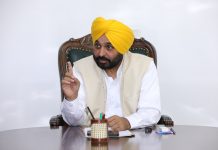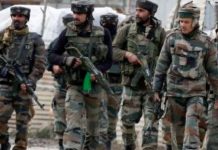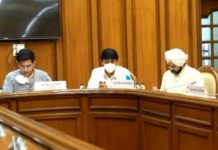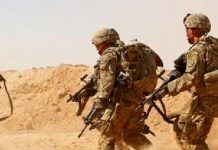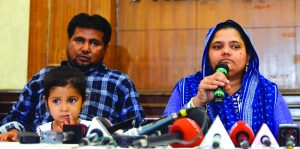 Seventeen years long legal struggle of Bilkis Bano, a victim of the infamous 2002 Gujarat riots, has earned her a compensation of 50 lakh through a recent order of the Supreme Court. Beside directing the Gujarat government to give 50 lakh compensation, the apex court has also told the authorities to give a job and accommodation to Bilkis Bano, who was gang raped during the 2002 riots in the state.
Seventeen years long legal struggle of Bilkis Bano, a victim of the infamous 2002 Gujarat riots, has earned her a compensation of 50 lakh through a recent order of the Supreme Court. Beside directing the Gujarat government to give 50 lakh compensation, the apex court has also told the authorities to give a job and accommodation to Bilkis Bano, who was gang raped during the 2002 riots in the state.
A bench headed by Chief Justice Rajan Gogoi was informed by the Gujarat government that action has been taken against the erring police officials in the case. A bench, also comprising Justices Deepak Gupta and Sanjiv Khanna, was informed by the state’s counsel that pension benefits of the erring officials have been stopped and the IPS officer who was convicted by the Bombay High Court in the case has been demoted by two ranks.
Bano had earlier refused to accept the offer of 5 lakh and had sought exemplary compensation from the state government in a plea before the top court. The top court had earlier asked the Gujarat government to take disciplinary action in two weeks against the erring police officials, including an IPS officer, convicted by the Bombay High Court in the case.
A special court had on 21 January, 2008 convicted and sentenced to life imprisonment 11 men for raping Bano and murdering seven of her family members in the aftermath of the Godhra riots, while acquitting seven persons including the policemen and doctors.
Bilkis Bano, during a press conference after the Supreme Court order, said she she was not “at peace” since she was gang-raped by 11 men; and 14 members of her family were murdered during the 2002 violence, including her 3-and-half-year-old daughter. She was the only adult survivor and eyewitness to the massacre.
“The honorable Supreme Court has let me know it stands with me. It understood my pain, my suffering and my struggle to regain the constitutional rights that were lost in the violence of 2002. No citizen should have to suffer at the hands of the state, whose duty it is to protect us,” she said.
Bano said that after many years of her dreams being suppressed, she stands vindicated as a survivor. “My dreams are boundless,” she said. She says she has big dreams for her children: “I will use this money to educate my children and give them a stable life. My eldest daughter wants to be a lawyer. Perhaps she will appear before the same court some day, to argue for justice to others. This is my prayer.”
She also said her victory is on behalf of other women who also suffered communal violence, but may not have been able to get justice from the legal system. Bano says she wants to use the compensation to help these women survivors and help educate their children. She wants to help the survivors in memory of her first husband and their first born daughter Saleha, who were killed during the riots. Bilkis Bano also pledged to put aside a part of the money to help other victims of the communal violence.
“I pray today that the spirit of the victims like her, the courage of survivors, the struggles of ordinary citizens, and the democratic institutions of India will come together again and again to end the hate and fear that is gripping our country,” says Bano. She also gave special credit to various agencies such as the NHRC and the CBI, which she says believed in her case and re-investigated it “with honesty and impartiality.”
Only in 2008 did a special court convict and sentence 11 men to life imprisonment for the rape and murder. The Bombay high court upheld the sentence and also set aside the acquittal of other accused persons, such as some Gujarat police officers and government doctors. The Supreme Court also asked the Gujarat government what action it had taken against the police officers involved in her case, as they were continuing to receive government benefits. The Gujarat government told the Supreme Court that they had demoted one of the police officers by two ranks.
The husband of Bilkis Bano, meanwhile, has demanded compensation from the state government. “We will wait for the government to pay us compensation before approaching the court,” her husband Yakub told reporters here at an event organised by the civil society members to felicitate the special public prosecutor in the case, RK Shah. Bilkis said she and her family faced much hardship during their fifteen-year-long fight for justice, but received no support from the government despite repeated appeals.
“We have faced many difficulties during these fifteen years. We frequently changed house, while also being worried about the education of our children. Gujarat government has not given us any support, nor have we received support from any government official,” Bilkis said
When asked if they are thinking of going back to their village in Dahod district, Yakub said they would like to return, but would face hostility there. “The convicts and their relatives live there. Our family is destroyed….I do not want to go back in this situation,” he said, adding that he wants their five children to get education so that they could become lawyers and help victims like them, he said. Advocate Shah said the case was unusual, and Bilkis’s deposition before the court was a crucial piece of evidence.
“This was an unusual, complex case where police filed a report saying the accused could not be traced. Only because the CBI investigated it, we could have them prosecuted,” he said. “The incident took place at a deserted place with no eye-witnesses. Bilkis saw her relatives getting murdered. Her account before the court was vital. She was cross-examined for 22 days by three learned lawyers. We examined 73 witnesses, but Bilkis’s deposition was the most important.
No other witness’ account was valued (as much). “Whoever the victim is, she should get justice. For a successful court case, we need a skilled prosecutor and a sensitive judge,” he added. Gagan Sethi of NGO Janvikas, which helped Bilkis in her legal fight, said they never doubted the judicial system but there should be better prosecutors, lawyers and judges at the district-level courts. “Police may be wrong at times, but they are not a state unto themselves.
Our district-level courts still do not have good prosecutors, lawyers or judges,” he said.
TWISTS AND TURNS IN BILKIS BANO CASE
On March 3, 2002 Bilkis Bano’s family was attacked by a mob at Randhikpur village near Ahmedabad during the post-Godhra riots.
Bilkis, five months pregnant at that time, was gang-raped and several members of her family were killed.
The trial in the case initially began in Ahmedabad.
After Bilkis expressed apprehensions that the witnesses could be harmed and the CBI evidence tampered with, the Supreme Court transferred the case to Mumbai in August 2004.
A special court had on 21 January, 2008 convicted and sentenced to life imprisonment 11 men for raping Bilkis and murdering seven of her family members, while acquitting seven persons including the policemen and doctors.
The high court, on May 4, 2017, convicted seven people – five policemen and two doctors – under charges of not performing their duties and tampering of evidence.
The top court had on July 10, 2017 dismissed the appeals of two doctors and four policemen,
including an IPS officer R S Bhagora, challenging their conviction by the high court saying there was “clear-cut evidence” against them. One of the officers did not appeal.
The convicts had later approached the Bombay High Court and sought quashing and setting aside of the trial court’s conviction.
The CBI had also filed an appeal in the high court seeking harsher punishment of death for three of the convicted persons on the ground that they were the main perpetrators of the crime.
The convicts had challenged the order on three main grounds – that all evidence in the case was fabricated by CBI, that Bilkis gave birth to a child after the incident, proving that she could not have been gang raped, and the failure to find the bodies of some of her family members which proved that they were not killed.







